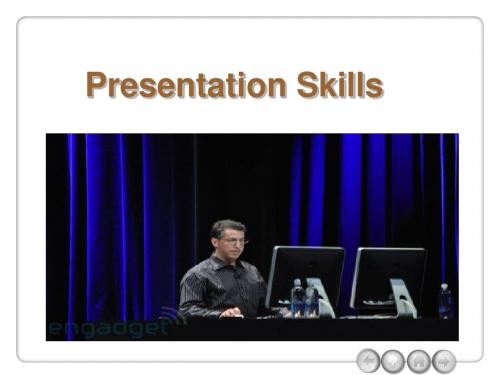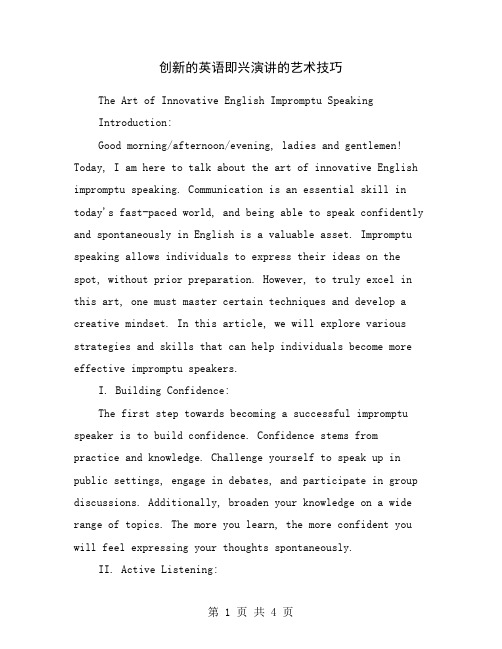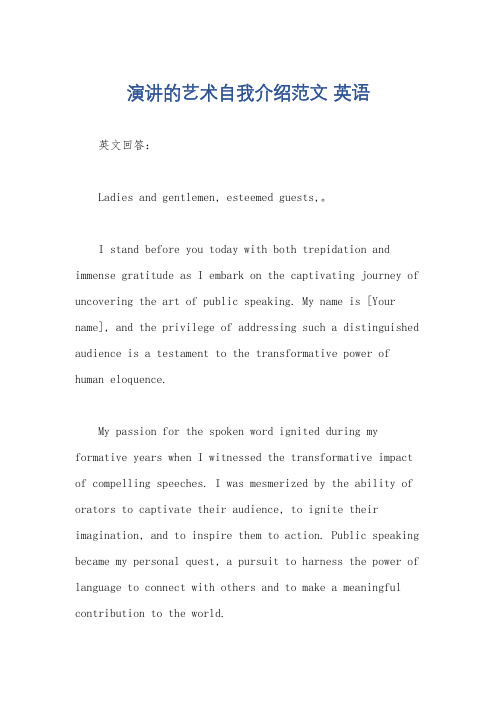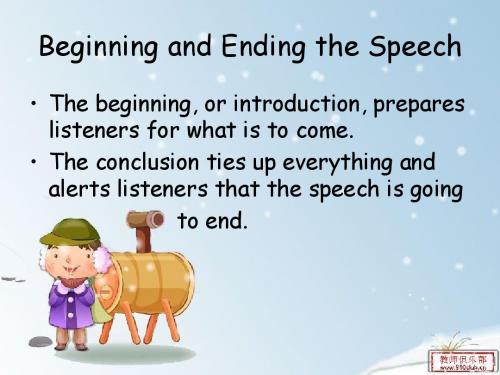英语演讲的艺术One
《演讲的艺术》About Introduction

2. Startle the Audience
Make sure the startling introduction relates directly to the subject of your speech
Introduction: Sample Introduction: ( A speech about the problem of sexual assault against women ) Take a moment and think of the three women closest to you. Who comes to mind? Your mother ? Your sister ? Your girlfriend? Your wife? Your best friend? Now guess which one will be sexually It’s assaulted during her lifetime. It s not a pleasant thought, but U. according to the U.S. Department of justice, one of every three American women will be sexually assaulted sometime during her life.
Task 1: Find out how many methods we’ve learned today are used in this introduction. Task 2: Give some explanation about how they are employed.
Vocabulary gridlock: (n),交通全面阻塞 cripple: (vt),使…陷入瘫痪状态 strand: (vt),使…困于某地,束手无 策. impenetrable: (adj), 费解的,难 以理解的。 simulation : (n)用计算机进行的 模拟。 stilled : (j)静止的。 earthly : (adj)现世的。 jaw-dropping apathy : (n)冷漠,不关心。
创新的英语即兴演讲的艺术技巧

创新的英语即兴演讲的艺术技巧The Art of Innovative English Impromptu SpeakingIntroduction:Good morning/afternoon/evening, ladies and gentlemen! Today, I am here to talk about the art of innovative English impromptu speaking. Communication is an essential skill in today's fast-paced world, and being able to speak confidently and spontaneously in English is a valuable asset. Impromptu speaking allows individuals to express their ideas on the spot, without prior preparation. However, to truly excel in this art, one must master certain techniques and develop a creative mindset. In this article, we will explore various strategies and skills that can help individuals become more effective impromptu speakers.I. Building Confidence:The first step towards becoming a successful impromptu speaker is to build confidence. Confidence stems frompractice and knowledge. Challenge yourself to speak up in public settings, engage in debates, and participate in group discussions. Additionally, broaden your knowledge on a wide range of topics. The more you learn, the more confident you will feel expressing your thoughts spontaneously.II. Active Listening:Active listening is an integral part of impromptu speaking. When given a topic, truly listen to what is being said. Pay attention to key points, arguments, and any supporting details. By actively listening, you can quickly grasp the essence of the topic, leading to a more effective impromptu response.III. Organizational Frameworks:Impromptu speaking requires structure and organization. One effective technique is to utilize organizational frameworks such as the PEE (Point, Evidence, Explanation) structure or the PEEL (Point, Evidence, Explanation, Link) structure. These frameworks help structure the flow of your thoughts and ensure that your impromptu speech has a logical sequence.IV. Creativity and Flexibility:Impromptu speaking demands creativity and flexibility. Be open-minded, embrace different perspectives, and adapt to unexpected situations. To enhance your creativity, expose yourself to various art forms, engage in brainstorming exercises, and read widely. A flexible mindset will enable you to think on your feet and respond to any impromptu prompt with finesse.V. Utilizing Rhetorical Techniques:Rhetorical techniques can enhance the effectiveness of impromptu speaking. Techniques such as the use of rhetorical questions, metaphors, anecdotes, and vivid imagery can captivate the audience and leave a lasting impression. Practice incorporating these techniques into your impromptu speeches to engage and persuade your listeners.VI. Mastery of Body Language:Body language is a vital aspect of effective impromptu speaking. Maintain eye contact with your audience, use gestures to emphasize key points, and vary your tone of voice to convey emotions. Confident body language enhances your credibility as a speaker and keeps your audience engaged throughout your impromptu speech.VII. Practice and Feedback:Impromptu speaking requires practice, practice, and more practice. Engage in mock impromptu sessions with friends or join public speaking clubs that offer impromptu speaking activities. Moreover, seek honest feedback from your peers or mentors. Constructive criticism will help you identify areas for improvement and refine your skills.VIII. Developing Quick Thinking:Impromptu speaking often calls for quick thinking. An effective technique to develop this skill is through the practice of critical thinking exercises. Solve puzzles,engage in debates, and think critically about various scenarios to sharpen your ability to think on your feet.Conclusion:In conclusion, the art of innovative English impromptu speaking is a valuable skill that can greatly enhance one's communication abilities. By building confidence, actively listening, utilizing organizational frameworks, being creative, employing rhetorical techniques, mastering body language, practicing regularly, and developing quick thinking, individuals can excel in this art form. Remember, practice makes perfect, and while it may seem daunting at first, through perseverance and dedication, anyone can become askilled impromptu speaker.。
演讲的艺术自我介绍范文 英语

演讲的艺术自我介绍范文英语英文回答:Ladies and gentlemen, esteemed guests,。
I stand before you today with both trepidation and immense gratitude as I embark on the captivating journey of uncovering the art of public speaking. My name is [Your name], and the privilege of addressing such a distinguished audience is a testament to the transformative power of human eloquence.My passion for the spoken word ignited during my formative years when I witnessed the transformative impact of compelling speeches. I was mesmerized by the ability of orators to captivate their audience, to ignite their imagination, and to inspire them to action. Public speaking became my personal quest, a pursuit to harness the power of language to connect with others and to make a meaningful contribution to the world.Over the years, I have immersed myself in the study of rhetoric and communication. I have pored over the works of master orators, from the classical eloquence of Cicero to the modern brilliance of Martin Luther King Jr. I have sought guidance from renowned teachers, eager to absorb their wisdom and refine my craft. Each experience has been a stepping stone on my path toward becoming an effective public speaker.The art of public speaking, I believe, is an intricate tapestry woven from a multitude of essential elements. It demands a deep understanding of one's audience, a mastery of language, an unwavering conviction, and the ability to engage and captivate. Like a symphony conductor leading an orchestra, a great orator harmonizes all these elements to create a profound and lasting impression.At its core, public speaking is about the power of connection. It is about building a bridge between the speaker and the audience, a bridge that allows for the exchange of ideas, emotions, and experiences. Through thespoken word, we have the ability to transcend the boundaries of time and space, to touch the hearts and minds of others, and to inspire them to greatness.In this pursuit, there will undoubtedly be challenges along the way. The fear of public speaking is a universal human experience, but it is a fear that can be overcome with preparation, practice, and perseverance. For true eloquence is not born out of perfection, but rather from the courage to embrace our imperfections and to use them as fuel for growth.As I embark on this journey, I am filled with both excitement and humility. I am excited to share my passion for the art of public speaking and to inspire others to discover their own potential as communicators. And I am humbled by the opportunity to learn from each of you, to grow both as a speaker and as a human being.Public speaking is an art that empowers us to make a difference in the world. Through our words, we can educate, motivate, inspire, and unite. We can bridge divides, fosterunderstanding, and create a better future for ourselves and for generations to come.I invite you to join me on this extraordinary adventure. Let us explore together the boundless possibilities of the spoken word and embrace the transformative power of human eloquence.Thank you.中文回答:尊敬的各位来宾,女士们、先生们,。
英语演讲的艺术

A successful beginning could:
I. Get the attention and interest of your audience. II. Create a positive relationship with the audience. III. Establish your credibility. IV. Preview the body of the speech.
Beginning and Ending the Speech
E. Begin with a story Example:
We usually do not have a high opinion of people who drop out of school. Well , I want to mention a man who did just that. He never finished college. In stead, in the 1970’s he tinkered in is garage with a relatively new gadget called the computer. Instead if being concerned with how to build a better computer or even different computer, this young man focused his attention on the software programs that might run on the computer. Today, Bill Gates is the richest man in the world, and the company he founded, Microsoft, makes programs for most of the computers in the world. Not bad for a college dropout.
演讲的艺术自我介绍范文 英语

演讲的艺术自我介绍范文英语英文回答:Ladies and gentlemen of the distinguished judging panel, esteemed guests, fellow competitors, and dear audience,。
I stand before you today with both trepidation and exhilaration, filled with a profound sense of gratitude for the opportunity to share my passion for the art of public speaking. My name is [Your Name], and I am a student at [Your University].My journey into the realm of oratory began at a tender age. Inspired by the eloquent speeches of historicalfigures and the persuasive arguments of courtroom attorneys, I yearned to master the power of words. I spent countless hours practicing in front of mirrors, meticulously crafting my delivery and honing my ability to captivate an audience.As I grew older, my passion for public speaking onlydeepened. I joined my school's debate team, where I engaged in lively and thought-provoking discussions with fellow students. I participated in speech competitions, where I learned the art of structuring a compelling argument, presenting it with confidence, and responding gracefully to rebuttals.Beyond competitive settings, I sought out opportunities to share my voice and perspectives. I volunteered to give presentations at community events, sharing my knowledge on various topics and advocating for causes I care about. Ialso became involved in student government, where I represented my peers and presented their concerns to school administrators.Through these experiences, I have developed a deep appreciation for the transformative power of public speaking. I have learned that words have the ability to inspire, persuade, educate, and bring about positive change.I have also discovered the importance of authenticity, empathy, and connecting with audiences on a personal level.Today, I am honored to stand before you and share my experiences and insights on the art of public speaking. I believe that public speaking is an essential skill for anyone who aspires to make a difference in the world. It is a powerful tool that can be used to educate, inform, inspire, and lead.I am committed to using my voice and my passion for public speaking to promote dialogue, foster understanding, and create a better future for all. I hope that throughthis competition, I can inspire others to embrace the art of public speaking and use it as a force for good in the world.Thank you.中文回答:尊敬的评委老师、嘉宾、参赛选手和亲爱的观众们,。
theartofpublicspeaking公共演讲的艺术

9 The art of public Speaking 公共演讲的艺术1. The need for effective public speaking will almost certainly touch you sometime in your life. When it does, you want to be ready. But even if you never give another speech i n your life, you still have much to gain from studying public speaking. Your speech class will give you training in researching topics, organizing your ideas, and presenting yourself skillfully. The training is invaluable for every type of communication.1、在你生活的某个时刻,几乎必定(almost certainly)需要做某种有影响力的(effective)公开演讲。
当这个时刻来到时,你希望自己十分有把握。
但是,即便你在生活中从未发表过一个演讲,你仍然会从学习公共演说中获益良多(gain from)。
你的演讲课将会在研究主题、组织思路和表现技巧方面对你进行训练。
这种训练对任何类型的交流都是非常宝贵的(invaluable)。
2. There are many similarities between public speaking and daily conversation. The three major goals of speaking-to inform, to persuade, to entertain-are also the three major goals of everyday conversation. In conversation, almost without thinking about it, you employ a wide range of skills. You organize your ideas logically. You tailor your message to your audience. You tell a story for maximum impact. You adapt to feedback from your listener. These are among the most important skills you will need for public speaking.2、在公开演讲(public speaking)和日常交谈(daily conversation)之间有许多类似的东西(similarity)。
《演讲的艺术》chapter1-5课后summary
Although you will write a complete manuscript or outline of your speech when preparing it, you should deliver it extemporaneously. This means you have rehearsed fully and can present your talk from a brief set of speaking notes. Concentrate on establishing eye contact with the audience and on speaking in a dynamic, engaged tonof voice
The general purpose of your speech will usually be to inform or to persuade. When your general purpose is to inform, your goal is to communicate information clearly, accurately, and interestingly. When your general purpose is to persuade, your goal is to win listeners over to your point of view
英语演讲有哪些技巧整理
英语演讲有哪些技巧整理英语演讲有哪些技巧许多人都惧怕在公众场合讲话。
用中文在公共场合演讲原来就很难。
假如要用英文来演讲的话,那更是难上加难。
假如你把握了正确的方法和套路,自己的心里面布满了自信,就不会再可怕了,一起学习英语演讲有哪些技巧吧英语演讲有哪些技巧绝技一:亲切感使用第一人称“I”而不是“one”,使用简洁生动的主动语态,而不是简单乏味的波动结构,这样似乎是演讲者自己直接和观众说话,拉近了双方的距离,促进双方的相互沟通。
绝技二:正确发音发音正确、清楚、连贯、美丽是吸引听众的最有力的法宝。
英语和美语有很多地方口音,这是不值得仿照的。
发音不准会引起误会,影响演说的效果。
尤其要留意区分以下几个音://。
其次,要留意在正确的位置连读。
绝技三:用词精确查找恰当的词是没有肯定的法则的,但通常最简洁的词、最详细、最能生动地引起感官反应的词语是最佳选择。
尽量少用形容词和各种限定词,着重实意动词和名词的使用。
时多查阅字典,一本好的分类词典会对你有很大关心的。
绝技四:俚语的使用俚语可以让演讲生动活泼,也可以使演讲陈旧过时。
假如不太熟识最新的俚语,会让演讲者本身显得与时代脱节。
慎用俚语。
假如使用一个效果不错又形象生动的俚语来表达你想表达的内容,效果会好许多。
但要留意千万不要使用带种族颜色和秽的俚语。
绝技五:节奏的把握除了语速和音量,演讲的节奏也是关系成败的一个重要因素。
别忘了演讲中也有标点符号,适当的停顿不仅会显得张弛结合,同时能给听众供应一个理解回味的时候,集中他们的。
另外,把握节奏的快慢有助于演讲的时间,同时也是传递感情的一种方式。
绝技六:排比的运用排比是一种写作修辞手法,也是一种普遍应用的演讲技巧。
排比是用句法结构相同的段落、句子或词组,把两个或多个事物加以比较,借以突出它们的共同点和不同点。
许多时候,排比的段落或句子是以一种递进的方式排列,营造出一种雷霆万钧的气概,同时琅琅上口,富有乐感。
演讲的四个目标供应信息:To offer information;使听众感到乐趣:To entertain the audience;动之以情:To touch emotions;使听众行动起来:To move to action。
英语经典演讲稿的艺术性与说服力:深度解析
英语经典演讲稿的艺术性与说服力:深度解析Introduction:英语经典演讲稿是当今世界上最受欢迎和受尊重的演讲之一。
其文本同时拥有艺术性和说服力,因此可以在许不同的场合和目的中使用。
在本文中,我们将深入探讨英语经典演讲稿的艺术性和说服力两个方面,并说明其影响力和作用范围。
Artistic Element of English Classic Speech:英语经典演讲稿的艺术性在于它们可以在文化、历史、音乐和诗歌方面给观众带来丰富的体验和感受。
这种艺术性同时也导致了演讲稿的多样性和创意性,使其成为人们从不同角度了解世界的重要工具。
以下是一些英语经典演讲稿的艺术性例子:1. Martin Luther King Jr.: "I Have a Dream"这场演讲是关于非裔美国人民权的,是20世纪最具影响力的演讲之一。
该演讲描绘了美国种族平等的理想,并使用了一系列比喻和象征,使其具有诗歌的韵律和音乐的节奏。
演讲的艺术性在于它的韵律、声音、语气和速度,这些都是用来增强演讲的效果和说服力。
2. Barack Obama: “Yes, We Can”这场演讲是奥巴马在2008年美国总统选举中的胜利演讲。
该演讲具有强烈的韵律和音乐感,使用了一些民歌和诗句,使演讲具有一定的诗意和歌唱性。
演讲的艺术性在于它的音乐性和韵律,这些是用来吸引听众并增强演讲的说服力。
3. Winston Churchill: “We Shall Fight on the Beaches”这场演讲是二战期间举世闻名的一次演讲。
它的艺术性在于它的声音、语气和节奏,这些都是用来表达钦佩、信心和坚定决心的。
演讲的艺术性在于它的热情和动感,这些是用来激发听众对英国的爱和支持。
The Persuasive Element of English Classic Speech:除了文本的艺术性之外,英语经典演讲稿的说服力也是它们受欢迎的原因之一。
演讲的艺术优秀大学生英语演讲稿
演讲的艺术优秀大学生英语演讲稿The Art of Public Speaking - A Reflection on Outstanding College Students' English SpeechesPublic speaking is an art, and the ability to deliver a powerful speech is an essential skill for success both in academic and professional settings. Today, I would like to reflect on the speeches delivered by outstanding college students, whose exceptional speaking abilities have inspired and captivated audiences across the world.The first quality that strikes me about these speeches is their clarity and conciseness. The speakers have a clear understanding of their audience and the purpose of their speech, and they use simple and precise language to convey their message effectively. They present their arguments with logical coherence, using examples and anecdotes to illustrate their points. Additionally, they pause and emphasize certain words or phrases for impact, using vocal variety and body language to keep the audience engaged.Another quality that distinguishes these speeches istheir authenticity and vulnerability. The speakers are notafraid to share their personal stories or opinions, even if they are controversial or unpopular. They speak from the heart, and their passion and conviction are palpable in their delivery. This authenticity allows them to connect with their audience on a deeper level, inspiring and motivating them to take action or think differently.Furthermore, these speeches demonstrate a deep appreciation for diversity and inclusivity. The speakers acknowledge and celebrate the differences among individuals and communities, and they advocate for greater understanding and acceptance. They use their platform to raise awareness of social issues, to challenge stereotypes and biases, and to promote a more equitable and just society.Lastly, these speeches reflect a strong sense of purpose and commitment. The speakers are not simply delivering a speech for the sake of it - they have a clear goal in mind, and they are passionate about making a difference. Whether they are advocating for environmental sustainability, promoting mental health awareness, or challenging gender norms, they demonstrate a deep sense of responsibility to their community and to the world.In conclusion, the art of public speaking is amultifaceted and complex skill that requires clarity, authenticity, inclusivity, and purpose. The speechesdelivered by outstanding college students embody these qualities, inspiring and empowering audiences across the world. As we navigate the challenges and opportunities of the 21st century, we must continue to cultivate this essential skill, recognizing the power of our words to change the world.。
- 1、下载文档前请自行甄别文档内容的完整性,平台不提供额外的编辑、内容补充、找答案等附加服务。
- 2、"仅部分预览"的文档,不可在线预览部分如存在完整性等问题,可反馈申请退款(可完整预览的文档不适用该条件!)。
- 3、如文档侵犯您的权益,请联系客服反馈,我们会尽快为您处理(人工客服工作时间:9:00-18:30)。
Informative Speech
• Inform the audience about an object, concept, process, or event
Seven Elements of Communication Process
• Speaker-演讲者 • Message-信息 • Channel-渠道 • Listener-听众 • Feedback-反馈 • Interference-干扰 • Situation-场景
Speaker
Your success as a speaker depends on: • Personal credibility • Knowledge of the subject • Preparation of the speech • Manner of speaking • Sensitivity to the audience
and the occasion • Enthusiasm
Message
• Whatever a speaker communicates to someone else
• Depends on what you say (verbal message) and how you say it (nonverbal message)
• 演讲的含义是什么?是指在特定的时空环境中,以 有声语言和相应的肢体语言为手段向公众传播信息, 以达到抒发情感、感召听众的效果。
Modern famous speakers
• Franklin Roosevelt • Martin Luther King • Margaret Thatcher • Nelson Mandela • … etc.
• Use of a visual aid is required • One part of final examination • Be delivered in week 11
Persuasive Speech
• To persuade the audience for or against a question or policy
The Art of Public Speaking
Yangxigang Department of Foreign Languages
Nanjing Forestry University 2014年4月
Sth about me
• Yang xigang (杨喜刚) • Email:jack7911@ • QQ: 281941380 • Address: No. 19 Building Room B239
• Student-centered • Task-based • speeches, discussions,
debates, evaluation of speaker’s performance • Audio-videos, slides, material analysis, etc.
1.4 Grading and Assessment:
• Narrow your topic down to something you can discuss adequately in the time allowed for the speech
What is public Speaking
• Public speaking as its name implies .is a way of making your idea public- of sharing them with other people and of influencing other people.
Course Introduction
• Improve skills of writing and presenting effective public speeches
• Special emphasis on informative and persuasive discourse
• Benefit you in your future career and life as a citizen in a global age
• Arrive on time and be prepared •No mobile phones •No QQ, MSN etc. etc. •Cheating and plagiarism or copying will result in a fail •Bring a dictionary •
• To improve your ability to listen effectively to public speeches
1.2 Content
1.2.1 Speech Writing • Topic selection • Speech types • Speech outline • Speech organization • style
Reading/listening materials: ★ renowned speeches ★ newspaper articles ★ audio files
1.6 Suggested Readings
• 纪康丽,Kellie,T. 2004. 校园英语口语. 英语演 讲艺术. 清华大学出版社, 2009.10.
• Grading and Assessment: Written assignments = 30% 3-5 articles Class participation = 10%
• group presentation = 20% Final Exam = 40%
Class requirements
[kə'mem(ə)rətɪv] speech
Introductory Speech
• Introduce yourself (or anyone around you)
• Focus on some aspect of your (anyone’s) personality, background, beliefs, or aspirations
• Lucas, S. 2004. The Art of Public Speaking.(重点推荐) ➢Connie Gibson,英语演讲艺术. 清 华大学出版社, 2009.10.
• 英语学习. (月刊) 外语教学与研究出版 社.English Language Learning
• 21st Century
• Gregory, H. 2002. Public speaking for college and career.
• 高健 (译注).2001. 英文散文一百篇. • 李元授 (主编). 2003. 演讲学. • Eastman, A. M. (ed.). 2004. The Norton
Reader : An Anthology of Expository Prose. • 柴瑞琴,大学生英语演讲. 北京市:国防工业 出版社, 2010.05.
• Seek either passive agreement or immediate action from the audience
• Emphasis is given to evidence and reasoning in constructing persuasive arguments
• PLEASE ASK QUESTIONS !!!
• Class Attendance: Class attendance is compulsory Each missed class will receive a 1% penalty 5 missed classes in total will result in an automatic fail for the whole course
• Use of correct language— cohesive ties, etc.
• Rules for debating
• Using accurate, relevant evidence, etc.
1.2.2 Delivery
• emotion, confidence, manners, etiquetteˈetɪˌket,
• China Daily
• Reader’s Digest
• Newsweek • Time • U.S. News and World Report • The Economist • Science • Nature • The Economist
ห้องสมุดไป่ตู้
Types of Speeches
• Introductory speech • Informative speech • Persuasive speech • Commemorative
• Pronunciation & intonation, tone, rate, pitch, loudness, use of pauses, manner, etc.
• Body language: eye contact, use of gestures, posture, etc.
1.3 Approach
Commemorative Speech
• To pay tribute to (称赞,歌颂)a person, a group of people, an institution, or an idea
